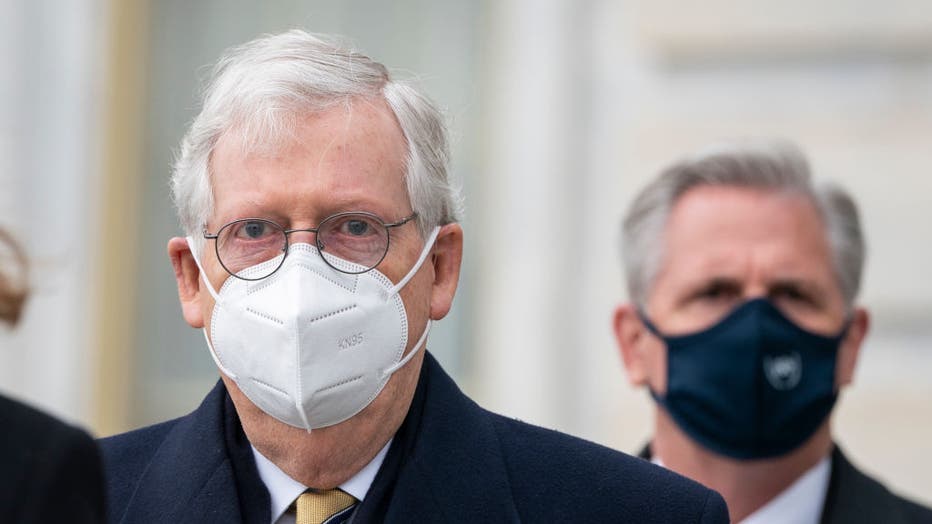Republicans rally solidly against Democrats' COVID-19 relief package
WASHINGTON (AP) - Republicans are closing ranks against Democrats’ proposed $1.9 trillion COVID-19 relief bill, even as the White House seemed to rule out a procedural Senate power play to protect one provision most treasured by progressives: a minimum wage hike.
Despite paper-thin congressional majorities, Democratic leaders were poised to push the sweeping package through the House on Friday. They were hoping the Senate, where changes seem likely, would follow quickly enough to have legislation on President Joe Biden's desk by mid-March.
By early Thursday, not one Republican in either chamber had publicly said he or she would back the legislation. GOP leaders were honing attacks on the package as a job killer that does too little to reopen schools or businesses shuttered for the coronavirus pandemic and that was not only wasteful but also even unscrupulous.
RELATED: Read the text: House Democrats publish full $1.9T COVID-19 relief bill — including $1,400 checks
"I haven’t seen a Republican yet that’s found something in there that they agree with," said House Minority Leader Kevin McCarthy, R-Calif. "I think all Republicans believe in three simple things: They want a bill that puts us back to work, back to school and back to health. This bill is too costly, too corrupt and too liberal."
The hardening opposition suggested that Biden’s first major legislative initiative could encounter unanimous GOP opposition. That was a counterpoint to his refrain during his campaign about bringing the country together and a replay of the Republican wall that new President Barack Obama encountered in 2009 and most of his administration.
Democrats showed no signs of backing down against Republican claims that the bill was wasteful, too expensive and not focused enough on key needs like reopening schools.
"This kind of reflexive partisan opposition is not going to wash with the American people. It wouldn’t wash at any time, but it especially doesn’t wash during this time of crisis," Senate Majority Leader Chuck Schumer, D-N.Y., said Thursday.

(L-R) Senate Minority Leader Mitch McConnell (R-KY) and House Minority Leader Kevin McCarthy (R-CA) arrive to watch the departure of ceremony of the remains of Officer Brian Sicknick leave the US Capitol after laying in honor in the Rotunda on Feb. 3
By mid-day, the most suspense was over an anticipated opinion from Elizabeth MacDonough, the Senate's nonpartisan parliamentarian, that could either bolster or potentially kill Democrats' hopes of using the package to gradually raise the federal minimum wage to $15 hourly by 2025.
If MacDonough decides the minimum wage provision must come out of the relief package, it would all but kill it because on its own it lacks enough support to overcome a Republican filibuster. It takes 60 votes to halt that tactic and the Senate is divided 50-50, with Vice President Kamala Harris allowed to cast only tie-breaking votes.
Another alternative would be for Democrats to bust through decades of Senate precedent, ignore the parliamentarian's view and keep the wage provision in the bill with their 51 votes.
But it is unclear if Democrats could achieve that. Some of their moderates oppose the minimum wage boost or want it dialed back, and others could be reluctant to defy Senate precedents that way.
White House chief of staff Ron Klain seemed to rule that option out when asked directly about that scenario.
"Certainly, that’s not something we would do," he told MSNBC host Joy Reid on Wednesday night. "We’re going to honor the rules of the Senate and work within that system to get this bill passed."
RELATED: 'I am optimistic now': Post-pandemic hiring could rebound quickly
Democrats are pushing the overall $1.9 trillion measure through Congress under special rules that will let them avoid a Senate filibuster by Republicans. But those same rules prohibit provisions with only an "incidental" impact on the federal budget because they are chiefly driven by other policy purposes. The parliamentarian decides if provisions pass that test.
If MacDonough decides the minimum wage provision can remain in the bill, it would be a major boost for its proponents. But there would still be no guarantee the measure would survive because of opposition from some Democrats, suggesting that grueling bargaining on its final form would lie ahead.
The minimum wage has stood at $7.25 since 2009. Winning the increase is a top priority for progressives at a time when Democrats control Congress and the White House.
The overall bill would provide millions of Americans with $1,400 direct payments to help them weather the pandemic that’s stalled much of the economy for a year and killed half a million people. It contains billions of dollars for vaccines and COVID-19 testing, schools, state and local governments and emergency jobless benefits while providing tax cuts or payments for many families with children.
In a sign of hardball politics ahead, top Republicans suggested that transportation spending for California and New York had been squeezed into the bill to benefit House Speaker Nancy Pelosi, D-Calif., who represents San Francisco, and Schumer.
McCarthy said the bill had $100 million to help extend the San Francisco area’s BART commuter rail system south to San Jose. That project was approved previously by the Trump administration, a top Democratic aide said.
McCarthy and Senate Minority Leader Mitch McConnell, R-Ky., suggested Schumer had won money for a bridge connecting upstate New York to Canada.

